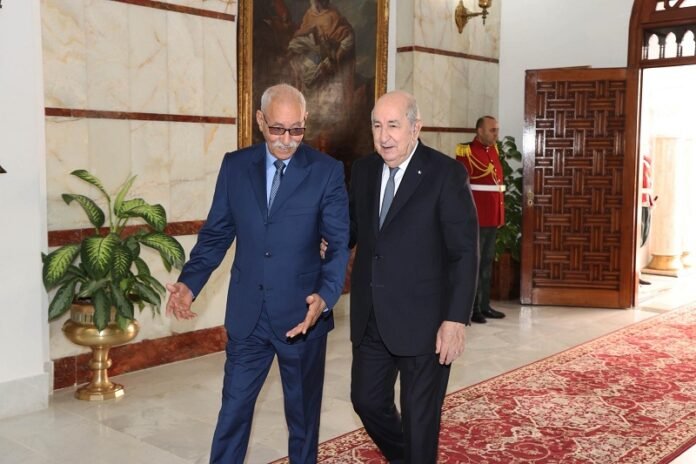Algeria is apprehensive about the accelerating rapprochement between Morocco and the Sahel countries and fears the growing regional and international support for the Moroccanity of the Sahara.
A statement issued by the Algerian presidency said that President Abdelmadjid Tebboune received, on Wednesday, Brahim Ghali, leader of the Polisario Front and president of the fictitious entity known as the “Sahrawi Republic,” and that they discussed bilateral relations and ways to strengthen them.
The statement emphasized portraying the illegitimate entity as a “state.” The meeting comes amid tensions and unrest in the Tindouf camps, as well as American and Western pressure on Algeria and the separatist front to seriously engage in negotiations to end the Sahara conflict, in accordance with Morocco’s proposal, which enjoys broad regional and international support.
The meeting also carries political messages that Algeria seeks to convey in response to the growing isolation in its African surroundings, in addition to both silent and open tensions with its Western partners, foremost among them France, which has joined the ranks of major powers supporting the Moroccanity of the Sahara and the autonomy initiative under Moroccan sovereignty as the only realistic solution to the fabricated conflict.
Analysts believe this reception represents a challenge to the current regional situation, especially in light of recent developments regarding the Moroccan Sahara conflict. These developments hastened Tebboune’s decision to receive Brahim Ghali.
Through this meeting with the head of the separatists, the Algerian president also seeks to show his country’s support for the Polisario, which is under severe pressure in the Tindouf camps due to continuing unrest and an uprising rejecting its repressive and selective practices against camp residents.
Algeria has previously distanced itself from these tensions, claiming that the management of the camps falls under the Polisario’s responsibility, in an attempt to evade its obligations as the host country and sponsor of the separatist front. Yet it remains accountable for any violations or repressive practices committed against the Sahrawis held in Tindouf under the control of the separatists.
Algeria and the Polisario no longer have much room for maneuver, especially after U.S. sources revealed that Washington had called on Algeria and the separatist front to enter serious negotiations to end the fabricated conflict, warning that the Polisario may be designated as a terrorist organization if it continues its current approach.
Moves by European countries to shut down Polisario representative offices due to the group’s ties with terrorist organizations in the Sahel also indicate that the noose is tightening around Algeria as its sponsor.
These developments place Algeria before difficult choices: either revise its stance toward the illegitimate entity and adopt a realistic approach, or face increasing isolation.
Should Algeria persist in its current stance, it will face more pressure and bear the consequences of its obstinacy and insistence on supporting the separatist narrative under the pretext of “self-determination.”
The principle of self-determination, behind which Algeria and the Polisario hide, has collapsed and become a thing of the past, according to Western reports which state that it is no longer valid in light of Morocco’s realistic proposal and the impossibility of holding a referendum for a limited number of Sahrawis held in the Tindouf camps, most of whom support remaining under Moroccan sovereignty and reject the separatist trend.
The unannounced meeting took place two days after…


